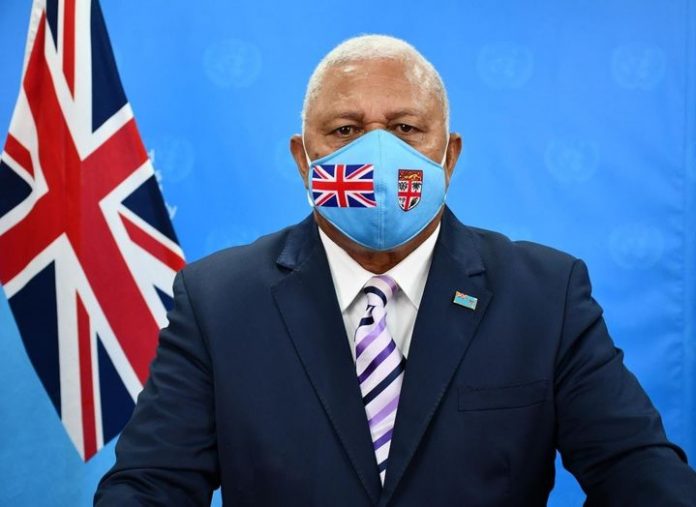At the meeting for leaders from the Alliance of Small Island Developing States (AOSIS), Prime Minister Voreqe Bainimarama highlighted the urgent need for challenges faced by Small Island Developing States (SIDS) to be placed at the core of global multilateral discussions.
The meeting convened at the margins of UNGA 76, focused on addressing key challenges faced by SIDS especially as a direct result of climate change and the COVID-19 pandemic.
The Alliance of Small Island States (AOSIS) Leaders have called for international solidarity and actions which is responsive to the challenges and needs of the SIDS ahead of the UN’s COP26 climate negotiations.
In his remarks, Prime Minister Bainimarama called on his fellow leaders to work closely with each other to take to COP26 a unified voice urging for a financial framework that recognises the contribution by carbon-emitting countries and compensating those states impacted by climate change.
“Why does SIDS have to pay punishing interest rates to finance their development when countries of the global north with greater debt exposure can access financing at near zero interest rates? Why can’t we fund recovery from climate catastrophes through grants? Why must we be forced to take on more loans to rebuild from climate catastrophes that are caused by others?” PM Bainimarama said.
“COP26 is our best vehicle to lock in a clear and firm commitment to loss and damage and our best hope of ensuring access to climate finance that supports low carbon, climate-resilient societies. Climate finance must keep up. US$100 billion annually up to 2025 is a given, and probably inadequate. US$750 billion annually beyond 2025 is a realistic starting point.”
The Prime Minister reiterated that the SIDS share of climate finance must be increased to at least 10 per cent of the total funds, not a measly two percent, and that has to be the AOSIS objective at COP26.
Actions that were outlined in terms of critical interest in protecting the ocean health included the need to secure a legally binding instrument under the United Nations Convention on the Law of the Sea (UNCLOS) on the conservation and sustainable use of marine biological diversity of areas beyond national jurisdiction (BBNJ).
“Pacific Leaders have declared our intention to maintain our maritime zones without reduction, and we do not intend to review and update the baselines and outer limits of our maritime zones, nor the rights and entitlements that flow from them, because of sea-level rise related to climate change.”
“Our survival is at stake, and our message to the world this UNGA must be simple and direct: “We are done talking. It’s time to act,” Prime Minister Bainimarama said.
Expressing similar sentiments, Gaston Browne, Prime Minister of Antigua and Barbuda, and AOSIS Chair said, “We call on the UN and our partners to enhance the support provided to SIDS by the UN system, including through on-the-ground presence. The support to SIDS should be responsive at a speed that is required by the challenges we face.”
“As a voice for the most vulnerable countries, we note that the challenges are great yet there are solutions, and the momentum is here and now.”
Since 1990, AOSIS has represented the interests of the 39 small island and low-lying coastal developing states in international climate change, sustainable development negotiations and processes. Its mandate is more than amplifying marginalised voices as it also advocates for these countries’ interests.
SOURCE: FIJI GOVT/PACNEWS














